- 02 9712 1736
- [email protected]
- 212 Great North Road, Five Dock, NSW 2046
- Open 7 days a week
Jaw pain can affect your life in surprising and uncomfortable ways every single day. If you’ve ever experienced clicking, aching, or stiffness in your jaw, you’re not alone. Millions of Australians deal with temporomandibular joint (TMJ) disorder, often called TMD. This condition can make simple actions like chewing or speaking painful and frustrating. Thankfully, a gentle and holistic treatment option exists—osteopathy offers real and lasting relief.
This blog explores how osteopathy treats TMJ disorder and jaw pain through a holistic approach. TMJ disorders can stem from teeth grinding, poor posture, or stress. Osteopaths examine connections between your jaw, neck, and spine, using gentle techniques like myofascial release and cranial osteopathy to address root causes. Research shows these treatments effectively reduce pain and improve jaw mobility. Self-care strategies complement professional treatment. Unlike methods that only mask symptoms, osteopathy aims to resolve underlying mechanical issues, offering Australians a non-invasive path to lasting TMJ pain relief.
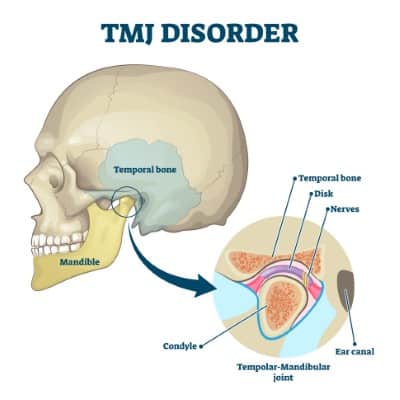
What Is TMJ Disorder and Why Does It Hurt So Much?
The temporomandibular joints connect your lower jawbone to each side of your skull. These joints allow you to open, close, and move your mouth smoothly in every direction. When the joints or nearby muscles stop working properly, TMJ disorder can develop quickly. Common symptoms include jaw pain, headaches, earaches, clicking sounds, and facial tension. You might even notice pain when yawning, eating tough foods, or sleeping on your side.
What Causes TMJ Disorders and Jaw Pain?
TMJ pain doesn’t usually have one simple cause—it’s often a mix of several factors. Teeth grinding, or bruxism, during sleep is a major contributor to long-term jaw tension. Poor posture, like slouching or forward head positioning, can strain your jaw muscles. Stress is another key factor—many people clench their jaw without even realising it. Injuries, arthritis, or misaligned teeth can also lead to chronic inflammation and pain. Even habits like chewing gum or biting your nails can overwork and stress your jaw.

Recognising the Signs of TMJ Disorder:
TMJ symptoms can creep up slowly, making early detection very important for effective care. You may feel pain or tenderness near the jaw joints or just in front of the ears. Clicking, popping, or grinding sounds while opening your mouth are all common signs. You might have trouble chewing certain foods or opening your mouth fully and comfortably. Tension headaches, especially around your temples, can also signal an underlying jaw issue.
The Osteopathic View of TMJ Pain:
Osteopaths understand that jaw issues rarely exist in isolation from the rest of the body. Your jaw works closely with your neck, shoulders, and even the upper back and spine. Restrictions in any of these areas can lead to muscle tension and joint dysfunction. Breathing patterns, pelvic tension, and even foot posture can influence jaw movement. By improving overall balance and alignment, osteopathy can relieve pain and prevent it recurring.
Osteopathic Techniques for Jaw Pain Relief:
Osteopaths use a range of techniques depending on your symptoms, posture, and medical history.
Each technique is chosen based on the individual’s presentation, pain triggers, and body mechanics.
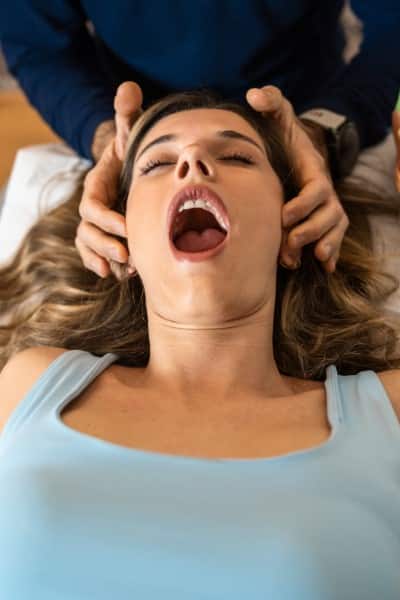
What to Expect in an Osteopathic Consultation:
An osteopathic assessment begins with a detailed discussion of your symptoms and health history. Your osteopath will assess jaw movement, alignment, and muscle tension by gently feeling the area. They may observe how you open your mouth, chew, and even how you breathe or sit. Postural assessments help identify habits that might be putting strain on your jaw muscles. Treatment involves hands-on techniques plus personalised advice on posture, exercises, and stress management.
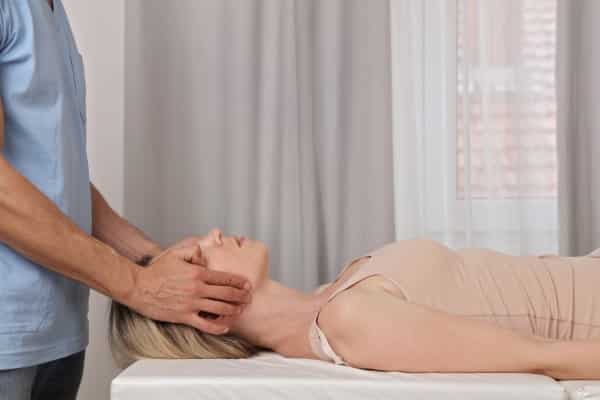
Scientific Research Supporting Osteopathy for TMJ Pain:
Emerging research continues to highlight the benefits of osteopathy for musculoskeletal conditions like TMD. A 2018 study in the Journal of Bodywork and Movement Therapies showed significant pain relief in patients. Participants reported reduced jaw discomfort and improved function after several osteopathic treatments. A 2020 study in Clinical Oral Investigations found long-term mobility improvements following osteopathic care. Additionally, the International Journal of Osteopathic Medicine notes changes in muscle and nerve feedback.
This “neuromuscular resetting” is part of how osteopathy can create lasting symptom relief.
Complementary Self-Care Strategies You Can Use at Home:
Your osteopath will often recommend simple habits and tools to support your healing between visits.
How Osteopathy Compares to Other TMJ Treatments:
Osteopathy is often more comprehensive than other treatments that only target one symptom area. Dental splints may help teeth grinding but don’t address tight neck or shoulder muscles. Pain medications can reduce discomfort but don’t fix the underlying cause of the disorder. Surgery is invasive and carries risks, while osteopathy offers a safe and non-invasive alternative. Osteopaths educate patients on posture, habits, and lifestyle changes for long-term relief and prevention.
When Should You See an Osteopath for TMJ Pain?
If your jaw pain lasts more than a few days or interferes with daily life, seek help. Recurring headaches, chewing pain, or a jaw that locks or clicks are warning signs to address. If past treatments haven’t worked or feel incomplete, osteopathy may offer new insights. It’s especially useful if your symptoms seem linked to posture, stress, or muscular tension.

Finding a Qualified Osteopath in Australia:
All registered osteopaths in Australia are trained through accredited university programs. Check the AHPRA (Australian Health Practitioner Regulation Agency) website to verify practitioner credentials. Look for osteopaths with experience in treating TMJ disorders. Ask how they approach jaw pain and whether they treat the neck, back, and posture too. Many clinics offer initial consultations so you can learn more before committing to treatment.
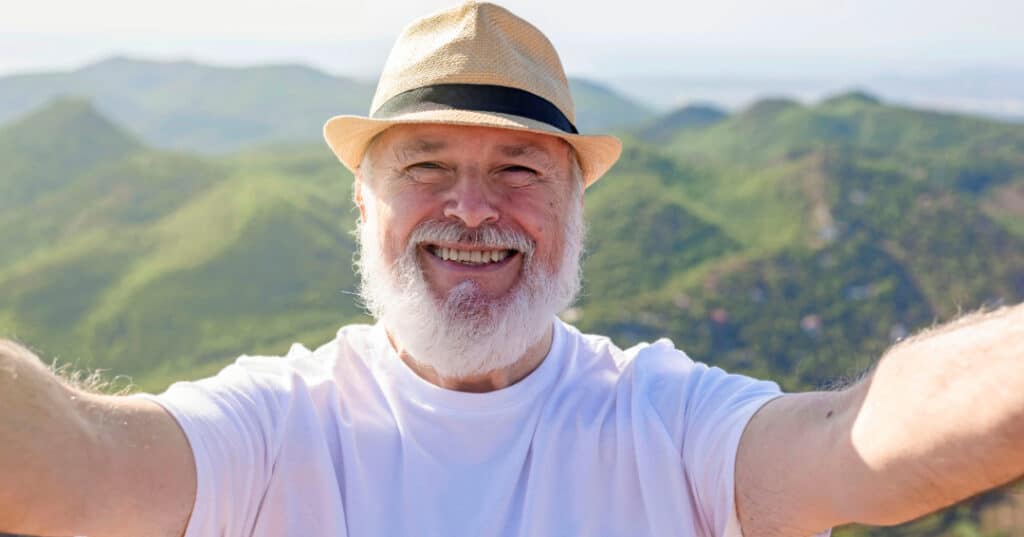
TMJ disorder and jaw pain can be frustrating—but you don’t have to live with it forever. Osteopathy offers a natural, drug-free path to understanding and healing your jaw pain. By treating the root causes and addressing your whole body, it supports true recovery.
With growing scientific backing and countless real-world success stories, osteopathy is worth exploring. If you’re tired of jaw pain holding you back, osteopathy might be the relief you need.

Luis is an empathetic osteopath whose gentle approach has helped countless patients find relief from pain and discomfort. With his warm personality and expert hands, Luis creates personalized treatment plans that address both your immediate symptoms and long-term wellbeing. His patients appreciate his thoughtful nature and ability to explain complex conditions in simple terms.
Originating from over in New Zealand, Luis developed a love for osteopathy and manual care from a young age, due to its holistic nature. With a special interest in manual therapy, anxiety and related breathing activities. You will find the care you need with Luis.
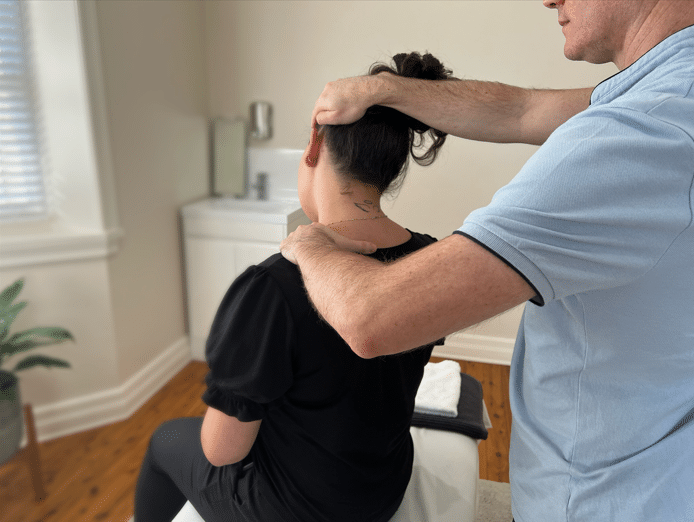
Forest Lodge, Annandale, Glebe, Leichhardt, Balmain, Haberfield, Canada Bay, Rozelle, Rodd Point, Wareemba, Stanmore, Petersham, Lilyfield, Hunters Hill, Enfield, Cabarita, Mortlake, Rhodes, Burwood Heights, Birchgrove, Gladesville, Huntleys Point, Abbotsford, Ashfield, Croydon Park, Croydon, Chiswick, Russell Lea, Burwood, Strathfield, Concord, Drummoyne, North Strathfield, Liberty Grove, Dulwich Hill, Lewisham, Camperdown, Ashbury, Homebush, Homebush West, Woolwich, Henley, Summer Hill, Sydney Olympic Park

About
Five Dock Osteopathic & Chiropractic is located in Canada Bay, in Sydney’s Inner West. Servicing suburbs including Burwood, Croydon, Drummoyne, Five Dock, Haberfield, Concord, Abbotsford, Chiswick, Leichhardt, Wareemba, Russell Lea, Summer Hill, Strathfield.
Clinic hours
Monday, Tuesday, Thursday 7AM – 7PM
Wednesday, Friday 7AM – 6PM
Saturday 7AM – 2PM
Sunday 8AM – 2PM
Contact details